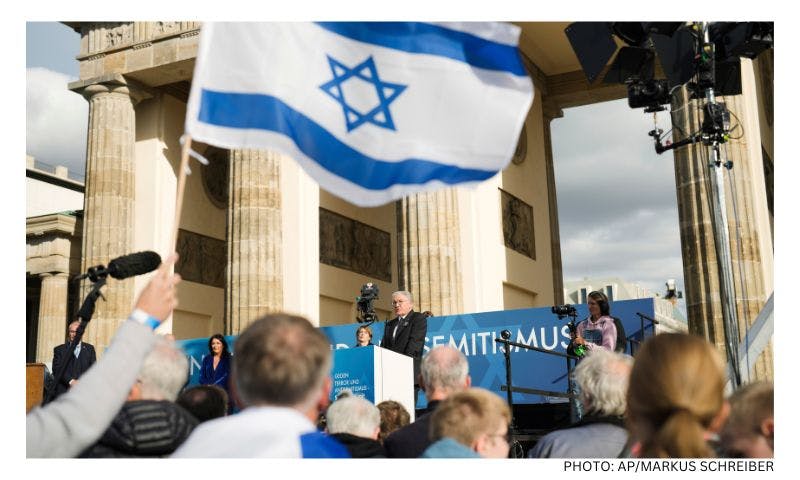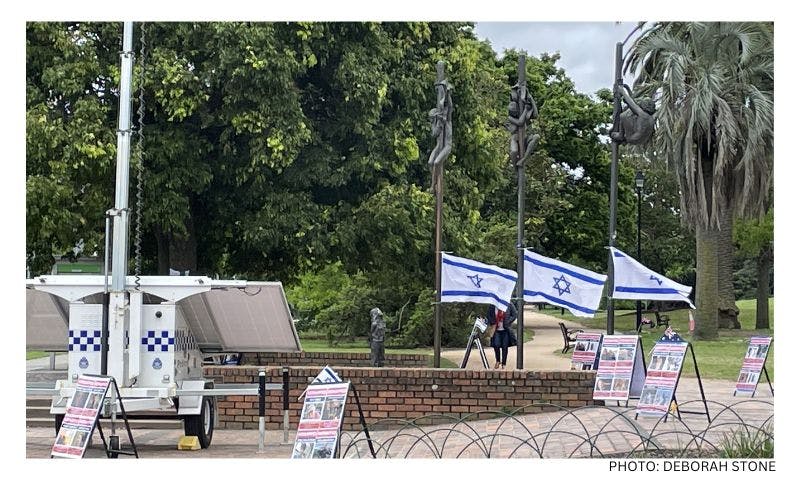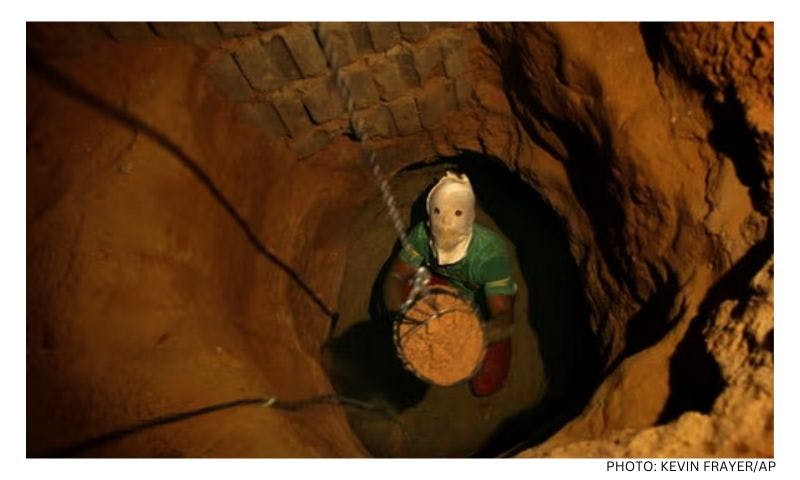Published: 8 October 2021
Last updated: 4 March 2024
PETER FRAY: John Lyons argues that the lobby, spearheaded by Colin Rubenstein, has cowed our media into going soft on Israel. Is he right? In large part no, in some part yes.
ALL JOURNALISTS, ESPECIALLY EDITORS, make choices, sins of omissions and commissions; secondly, all journalists, especially editors, will be lobbied, cajoled and sometimes abused by people or groups seeking to fashion those choices. The question is, to what extent does the latter dynamic influence the former?
In Dateline Jerusalem: Journalism’s Toughest Assignment, John Lyons argues, with a force fuelled by decades of experience and in a style best described as cool rage, that when it comes to reporting Israel, Australia’s news media has been beaten into submission by the local “pro-Israel lobby”.
This is especially true, he argues, about reporting Israel’s occupation of the West Bank. Unlike the rigorous debate going on inside Israel’s own media, we editors here have been brainwashed and cowed.
Editors are so scared of being labelled antisemitic they’ve been pulling their punches and most troubling of all, hiding from “most Australians” the extent and intent of Israel’s occupation of the West Bank (in fact, they run scared of using the O-word).
Stories are pulled or missed, coverage slanted and biased, hacks are lulled with trips, Israeli atrocities under-reported and journalists censored, contradicted and abused (sometimes by their own colleagues). One senior journalist even suggests to Lyons “the Israeli lobby” can have a young reporter fired.
The lobby’s personification is Colin Rubenstein, the executive director of the Australia/Israel & Jewish Affairs Council (AIJAC). So powerful is he that he gets to control what gets a run in the pages of the Australian newspaper about Israel. That sets him up in an exulted triumvirate with Rupert and Lachlan Murdoch.
Very few editors, says Lyons, will say no to Rubenstein; the phrase 'Colin won’t be happy if you run that story' echoes across newsrooms far and wide.
But it is not just the Oz. Voldemort-like, the very utterance of his name strikes trepidation in the heart of newsrooms the country over. Very few editors, says Lyons, will say no to Rubenstein; the phrase “Colin won’t be happy if you run that story” echoes across newsrooms far and wide.
So, is all this true? Lyons is a credible witness: senior journalist, former editor of the Sydney Morning Herald and a former Jerusalem-based correspondent (for the Australian).
His Walkley-award winning Four Corners story, Stone Cold Justice (2014), about the mistreatment of Palestinian kids by Israeli authorities in the West Bank certainly unleashed what he calls a “propaganda fatwa” against him and the ABC. More on that in a minute.
Lyons has a place from which to speak. But does he speak for all editors (he says he’s spoken to “scores”, though neither myself or longstanding editor of the Age, Michael Gawenda, are among them) and is what he’s saying right?
In large part no, in some part, yes.
Let’s start with Colin: that Rubenstein lets editors know when they are wrong from an AIJAC perspective is no big reveal. Editors come to expect a call. He demands and often gets, an opinion piece as rebuttal to “offensive” copy. Rubenstein plays the game hard and long. He can be a total pain in the arse, but that’s his job — and he is good at it.
(In fact, after reading the Lyons monograph, I think he should be asking Mark Leibler, AIJAC’s chairman, for a pay rise or demand a Top 10 spot on the AFR’s list of the country’s most powerful.)
But are Rubenstein and a few other Zionist radicals, mainly from Melbourne, basically running the joint? It’s here where Lyons stretches credibility and the limitations of my willingness to go along with his critique.
Are Rubenstein and a few others running the joint? It’s here where Lyons stretches credibility and the limitations of my willingness to go along with his critique.
Are editors aware they will upset the pro-Israel lobby from time to time? Yes.
Does the threat of being called an antisemite or worse lead to widescale mis- or non- reporting, to self-censorship? No, not in my experience.
Do they say “no to Colin”? Well, yes, I have on numerous occasions — and I am sure I am not alone.
What about the reporting?
For a start, Lyons largely ignores the scores of hard-nosed reporting done from and about Israel by the likes of Paul McGeough (SMH/Age), Sophie McNeill (ABC) and, of course, himself, just to name three. Such reporting is not commissioned or edited in a vacuum.
Lyons largely ignores the scores of hard-nosed reporting done from and about Israel by the likes of Paul McGeough, Sophie McNeill and himself, just to name three.
An example: in 2010, as editor of the SMH, I agreed to having McGeough and photographer Kate Geraghty travel on a flotilla bound for Gaza. That flotilla was intercepted at sea by the IDF, protesters were shot, McGeough and Geraghty detained.
Did I and other editors expect to incur criticism from AIJAC and Jewish readers? Of course, we did. But we did it anyway. In fact, worse criticism was to come.
In a subsequent editorial, and after I had been called an antisemite by numerous readers and Jewish community leaders, the SMH published an editorial arguing that it was a pity debate about the Middle East and Israel was so monochrome here, as opposed to Israel where it is deep, wide and the touchy subjects such as occupation of the West Bank often feature.
This is the sort of piece that Lyons says doesn’t happen here. Of course, discussion about settlements and so on will happen on a far, far more frequent basis in Israel: there, citizens are dealing with existential daily threats, front of mind issues.
Here, a diaspora, still largely informed by the experience of surviving the Holocaust, is seeking to support the existence of a Jewish homeland against threats, real and perceived, of antisemitism. The rest of us are observers, interested and often otherwise. In short, editors in Australia and Israel are dealing with different audiences, with different interests.
Most examples cited by Lyons as pro-Israel lobby interference are post-publication: the furore over the Glen Le Lieve cartoon (again in the Herald) in 2014, which showed a Jewish man watching the shelling of Gaza from his armchair; Lyons’ own “fatwa” after the Four Corners’ Stone Cold Justice program. Of course, you can’t see what isn’t published. But if the editors were so scared, you wouldn’t see such pieces at all.
The fact that the reaction to pieces [such as Lyons' Stone Cold Justice] is so fierce doesn’t mean such pieces are not being published. They are.
The fact that the reaction to such pieces is so fierce and prolonged doesn’t mean such pieces are not being published. They are.
Much of the essay relies on anecdotes. That is Lyons’ call. But a few more facts wouldn’t have gone astray.
Dateline Jerusalem starts with Lyons running, attempting to get fit after the broadcast of Stone Cold Justice so as to beat off the coming personal vilification. (As stylistic note for John: the lead is left hanging; it is not clear to me why being physically fit helped or hindered your cause. Is running a metaphor? Is there a link between weight and beating off antisemitism?)
The reaction to that piece clearly annoyed Lyons and has stayed with him ever since. As Gawenda has observed in The Age, this essay certainly isn’t about Jerusalem being journalism’s toughest assignment. Don’t read it if you want deep insights into Lyons’ time as a foreign correspondent. (He has done another book for that, Balcony Over Jerusalem.)
It is essentially about a bunch of people who got up his nose, big time, and who have a very hardline view of what should and shouldn’t be said in the Australian media.
But who doesn’t have such a view these days?
I agree with Lyons that Australia’s media should employ more Arabic-speaking journalists and newsrooms should be more diverse.
On reading the essay, I found myself thinking about whether the Western media spends too much time reporting the Middle East. The world is awash with atrocities and injustices, geopolitical challenges and diplomatic intrigue. Why spend so much time on Israel?
In an Australian context, for good or bad, the answer may be more about the likes of Colin Rubenstein than John Lyons. Because we all know what’s worse than being talked about in a negative way.
READ MORE
MICHAEL GAWENDA: Dealing with the Lobby is not the toughest gig (Age)
AIJAC STATEMENT ON JOHN LYONS BOOK
Dateline Jerusalem: Journalism's toughest assignment, by John Lyons, is published by Monash University Press




